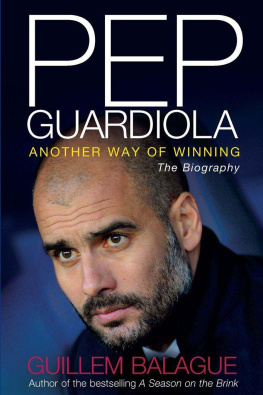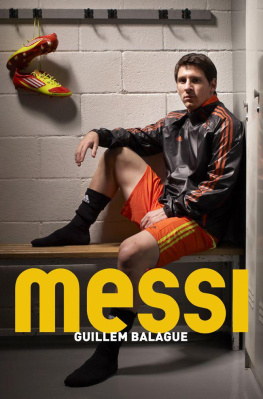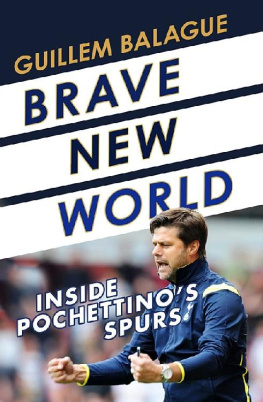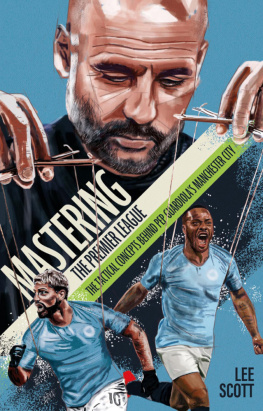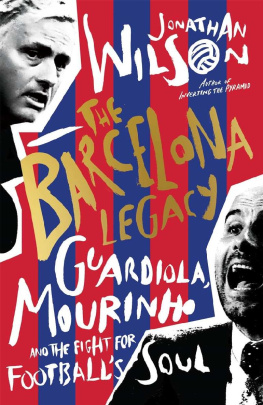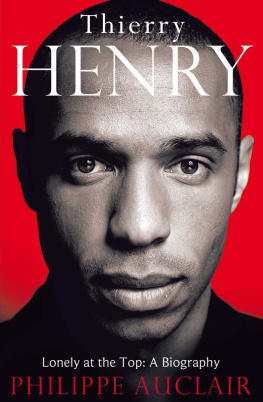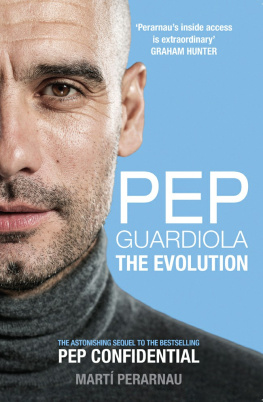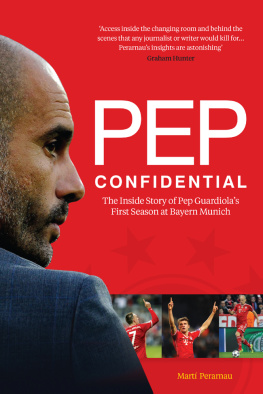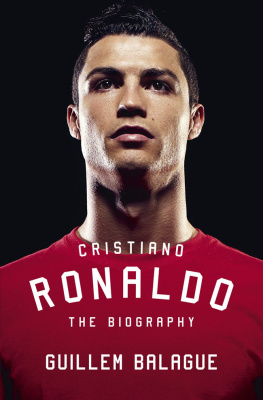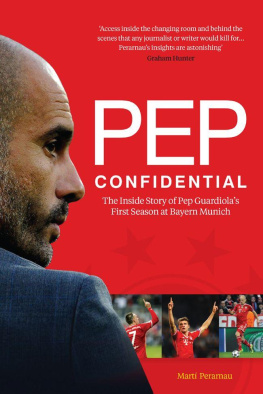
To my brother Gustavo (cul),
my sister Yolanda (new-born cul),
Luis Miguel Garca (who will never be cul)
and Brent Wilks (who reminds us constantly football is not about life and death)
CONTENTS
FOREWORD
by Sir Alex Ferguson
I missed out on signing Pep Guardiola as a player back at the time when he realised that his future no longer lay at Barcelona.
Although there wasnt any apparent reason for him to leave his club, we spoke to Guardiola and I thought I had a good chance of getting him: maybe the timing I chose was wrong. It would have been interesting; he was the kind of player that Paul Scholes developed into: he was captain, leader and midfield playmaker in Johan Cruyff s incredible Barcelona Dream Team and displayed a composure and ability to use the ball and dictate the tempo of a game that made him one of the greatest players of his generation. Those were the kinds of qualities I was looking for. I ended up signing Juan Sebastin Vern for that reason. Sometimes, you look back at a really top player and you say to yourself: I wonder what it would have been like if hed have come to United? That is the case with Pep Guardiola.
I can understand Peps situation as a player. When youre at a club like Barcelona, you would like to think you have a place for life. So when we approached him he probably thought he still had a future at the club even though he ended up leaving that season. It is a shame, because nothing is for life in football: age and time catch up with you and the day comes when both you and the club have to move on. At the time I thought we were offering Pep a solution, a different road in his career, but it didnt work out. It reminds me of Gary Neville. Having had Gary at Manchester United since he was twelve years old, he became almost like family: like a son, someone you depend upon and trust, who was part of the whole structure of the team. But one day it all finishes. In Peps case, the realisation that all that was coming to an end must have been difficult. I could understand his doubts, his delay in committing, but it got to a point where we had to look somewhere else and that opportunity disappeared.
One thing I have noticed about Guardiola crucial to his immense success as a manager is that he has been very humble. He has never tried to gloat, he has been very respectful and that is very important. It is good to have those qualities and, looking back, it is apparent that he has been unassuming throughout his career. As a player he was never the type to be on the front pages of the papers. He played his game in a certain way; he wasnt tremendously quick but a fantastic, composed footballer. As a coach he is very disciplined in terms of how his team plays, but whether they win or lose he is always the same elegant, unpretentious individual. And, to be honest, I think it is good to have someone like that in this profession.
However, it seems that he reached a point in his coaching career where he was conscious of the importance of his job at Barcelona while experiencing the demands attached to it. I am sure he spent time thinking, How long is it going to last? Will I be able to create another title-winning team? Will I be able to create another European Cup-winning team? Can I maintain this level of success?
If I had arrived in time to advise him, I would have told Pep not to worry about it: a failure to win the Champions League is not an indictment of his managerial abilities or of his team. I understand the pressure, though: the expectation was so high every time Guardiolas team played, everyone wanted to beat them. In fact, I think he was in a fortunate position in a way, because the only thing he had to worry about was how he was going to break down the opposing team to stop them winning.
Personally, I think its about keeping going. So, why go? It might be a question of controlling the players, of finding new tactics because teams have started working out Baras style of play. Or a question of motivating them. In my experience, a normal human being wants to do things the easiest possible way in life. For instance, I know some people who have retired at fifty years old dont ask me why! So the drive that most people have is different from that of individuals like Scholes, Giggs, Xavi, Messi and Puyol who, as far as I am concerned, are exceptional human beings and motivation is not an issue for them because their pride comes before everything. I am sure Peps squad was full of the types of characters who were an example to others and a source of motivation: not types who wanted to retire too early.
I know Gerard Piqu from his time here at United. I know his type of personality: off the pitch he can be a laid-back, easy-going guy, but on the pitch he is a winner. He was a winner here and we didnt want the boy to leave, and he is a winner there at Barcelona. The players Pep had under him needed less motivation than most. Perhaps Pep underestimated his motivational abilities? You could see what he consistently achieved with that Barcelona team and you need to have a special talent to keep them competing at that level and with such success for so long. But I am convinced he has enough weapons to do it again. And again and again.
What Guardiola achieved in his four years at the first team of Barcelona betters anything that previous coaches at the Camp Nou have done and there have been some great ones: Van Gaal, Rijkaard and Cruyff to name a few; but Guardiola has taken certain areas to another level such as pressing the ball and Barcelonas disciplined style of play and work ethic have become a trademark of all his teams. Pep created a culture where the players know that if they dont work hard, they wont be at the club. Believe me, that is not easy to do.
Whatever Peps next move may be after he has taken some time out, whether he moves to the Premier League or not, theres always going to be a lot of speculation surrounding his future. He was at a fantastic football club at Barcelona and it is not going to get any better for him wherever he goes. Going to another club will not take any pressure off him or reduce the level of expectation surrounding him. In fact, wherever he goes he is going to have the same experience: he is a manager; he has to decide what is best for his team, about choosing players and their tactics. It is that simple. In that respect it is the same wherever you go, because all managers jobs come with pressure. Ive been successful at Manchester United for many years and its not without its problems every hour of every day you have to deal with something. It comes down to the fact that you are dealing with human beings in the world of football. Theres a plethora of things to worry about: agents, family, form, injuries, age, profile, ego, etc. If Pep were to go to another club the questions would be the same as those he has faced so far. The expectation would follow him around.
So, why? Why would he decide to leave? When you asked me before Pep announced his decision, I did say that it would be silly not to see the job through. If you look at Madrid, who won five European Cups in the late fifties and early sixties, theres no reason to think that he couldnt have done the same with Bara. That to me would be a personal motivation if I had that team. And if I were Pep, leaving would have been the most difficult decision to make.
Sir Alex Ferguson
Spring 2012
Rome. 27 May 2009. UEFA Champions League final
It is the eighth minute of the match. Barcelona yet to find their rhythm. The players are all in the right positions, but none of them willing to bite, to step forward and pressure the man on the ball. They are playing within themselves, showing too much respect to Manchester United. Ronaldo has a shot saved by Vctor Valds. Another shot. United are getting closer. Cristiano fires just wide of the post. Centimetres. Thats the difference. Centimetres away from goal.
Next page
